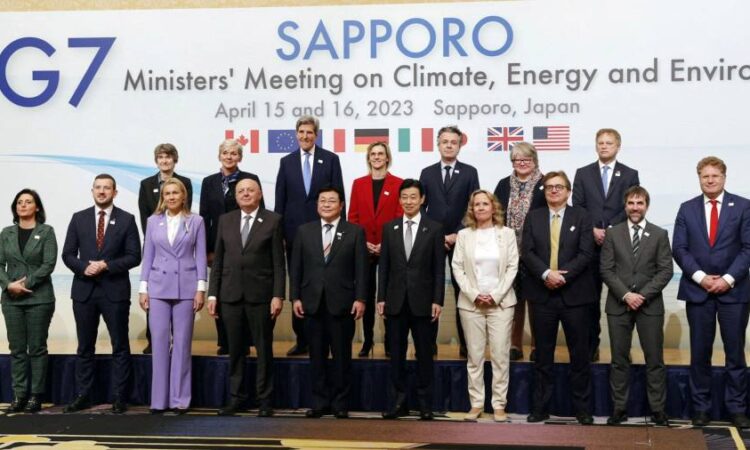
G7 countries have pledged to accelerate a gradual phaseout of fossil fuels and the shift towards renewable energy, as Japan faced significant pushback on key pillars of its climate strategy.
The agreement reached on Sunday followed weeks of fraught negotiations between Japan and other member states as the world’s most advanced economies sought to respond to criticism that they were backtracking on climate targets following the Ukraine crisis.
In its final communiqué from this weekend’s summit in Japan’s northern city of Sapporo, the G7 committed “to accelerate the phaseout of unabated fossil fuels so as to achieve net zero in energy systems by 2050”.
In earlier drafts, Japan had opposed adding the phrase, but the UK, Germany and France negotiated successfully for its inclusion.
The G7 also pledged to increase collectively offshore wind capacity by 150 gigawatts by 2030 and solar capacity to more than 1 terawatt. In addition, members agreed to work together to reduce Russia’s influence on supply chains in the nuclear energy sector following its invasion of Ukraine and weaponisation of gas supplies to Europe.
Environmental groups said the final version was far more ambitious than earlier drafts on the G7’s commitment to tackling the climate crisis.
But member states once again failed to set a firm timeline for phasing out coal-fired power plants amid continuing opposition from Japan, which has increased its reliance on coal, natural gas and oil following the Fukushima Daiichi nuclear disaster in 2011.
Tokyo has also argued that global climate efforts need to be supported by developing countries, and has pushed for the use of ammonia as a low-carbon energy source alongside gas or coal to reduce emissions from existing fossil fuel infrastructure.
But Japan’s approach has come under fire from environmental groups and scientists, who have warned that coal needs to be rapidly phased out if the world is to meet the targets of the Paris Agreement, where countries agreed to limit global temperature rises to less than 2C and ideally to 1.5C.
Temperatures have already risen by 1.1C since the pre-industrial era.
The 36-page document issued on Sunday reaffirmed the G7’s commitment “to achieving a fully or predominantly decarbonised power sector by 2035”, but the phrasing leaves open the possibility for continued use of fossil fuel-fired power.
“By failing to commit to fully decarbonising the power sector, to slashing road sector emissions and totally eliminate international fossil fuel finance, the ministers really missed an opportunity to provide leadership in addressing the climate emergency,” said Alden Meyer, senior associate at E3G, a climate consultancy.
Last year, the G7 added a loophole to a previous pledge to end investments in overseas fossil fuel projects by the end of this year and said investment in liquefied natural gas was a “necessary response to the current crisis”.
In the latest statement, the G7 said investment in the gas sector could be appropriate to “help address potential market shortfalls provoked by the crisis”.
On nuclear fuels, the UK said the agreement was aimed at “pushing” Putin out of the nuclear fuel market “as quickly as possible”.
The G7 said it would collaborate on exploring “strategic opportunities in uranium extraction, conversion, enrichment and fabrication”.
“This multilateral co-operation would enable us to strengthen our domestic sectors and establish a level playing field to compete more effectively against predatory suppliers,” the group said in a statement.
Russia is one of the world’s largest suppliers of enriched uranium for civilian nuclear programmes, with more than 40 per cent of enrichment capacity globally.
Several former Soviet bloc countries in Europe remain reliant on Russian nuclear fuel and have resisted pressure to ban it from the EU until they have an alternative, with many working with US company Westinghouse to convert to its fuel.
The climate meeting was held as Japan promised to reinforce security measures for G7 gatherings this month, after a man threw what appeared to be a smoke bomb at Prime Minister Fumio Kishida on Saturday while he was on the campaign trail ahead of local elections.
Additional reporting by Robert Wright in London
Climate Capital

Where climate change meets business, markets and politics. Explore the FT’s coverage here.
Are you curious about the FT’s environmental sustainability commitments? Find out more about our science-based targets here






